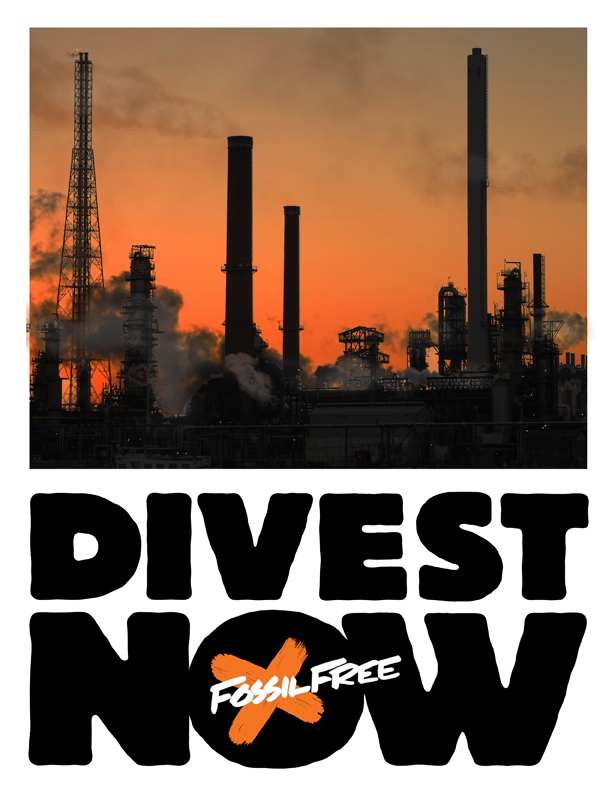Two thousand twelve brought not only record breaking temperatures, but also superstorms like Hurricane Sandy, record drought, and recent brushfires that have ravaged Australia. The earth is sending us a message: we cannot continue our rate of greenhouse gas emissions without facing dire consequences.
Both nationally and locally, awareness of climate change has created a movement encouraging universities across 300 campuses to discontinue their investments in the fossil fuel industry. The goal is to ultimately persuade the US government and energy industry to switch from oil and coal to renewable energy, significantly reducing destructive carbon emissions.

Fossil fuel divestment campaigns couldn’t come at a more necessary time or place. The US failed to ratify the Kyoto protocol and has detoured other meaningful international agreements, most recently at the Doha climate conference. With many public leaders still denying global warming and fossil fuel companies pushing for new, riskier methods of fossil fuel extraction, a US youth movement against climate change is desperately needed. We can’t wait any longer.
After a campus visit by environmentalist Bill McKibben last October, Syracuse University and SUNY-ESF joined the national movement to divest from fossil fuels and have been working to build student, faculty, and alumni support. The campaign seeks to both educate the local student bodies and to influence their respective administrations to divest from the fossil fuel industry.
The urgency of these actions is made clear by looking at the numbers. In 2009, the international community agreed to cap global warming at 2ºC (3.6ºF)—the maximum allowable increase that the earth’s climate can handle without devastating consequences. As a point of reference, we have created a 0.8ºC (1.4ºF) global temperature rise since the early 20th century —roughly half the allowable amount—with significant damage to the planet already. To keep below 2ºC, we need to burn less than 565 gigatons of carbon, an amount we will reach in less than 16 years given current rates. However, the total amount the fossil fuel companies have in reserves and plan to burn is 2,795 gigatons, nearly five times the amount required to reach the limit. We are well on our way to passing this point of no return in the next couple of decades. An increase in global surface temperatures such as this would have devastating effects: heretofore unheralded human migration, floods, drought, the erasure of coastal regions and island nations, food shortages, and unpredictable weather patterns like that which brought us Hurricane Sandy. We have to do something now to mitigate the consequences.
For institutions like universities with a stake in building a better future, investing in fossil fuels is a contradictory action. Bill McKibben writes, “It just doesn’t make sense for universities to invest in a system that will leave their students no livable planet to use their degrees on.” And divestment is a tactic that has worked before. US students in the 1980s encouraged their universities to drop stocks tied to South African apartheid, a movement that was so powerful that in Nelson Mandela’s first post-apartheid trip to the US, he went straight to the University of California to thank the students for their efforts.
With the $400 billion in endowments nationwide and $940 million at Syracuse University alone, the national movement hopes to put pressure on fossil fuel companies and investors by making fossil fuels a financial, environmental, and moral liability. After years of waiting for the right politicians to draft legislation that addresses the urgency of climate change, this campaign directs its action at the companies who make their business out of polluting the planet.
Climate change is among the biggest challenges humanity faces, and no one action will overcome it. It will take a massive shift in consciousness and lifestyle as well as global political action. Divestment in the US is a tactic that can help spark this paradigm shift. The movement must also spread further than college campuses if it is to succeed. Churches, community organizations, and even the city of Seattle have joined the commitment to divest. As citizens of the Syracuse community, you can help in many ways:
You can find our petitions and sign at: www.gofossilfree.org/campaigns.
If you are an SU or ESF alumna/us, we would love to have you involved—contact us by email.
If you are a community organization interested in divestment, we can direct you to resources that will help you get started.
If you are SU or ESF faculty, staff, or student, we meet Fridays at 3 pm. Contact us for details.





